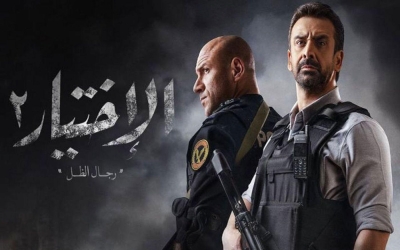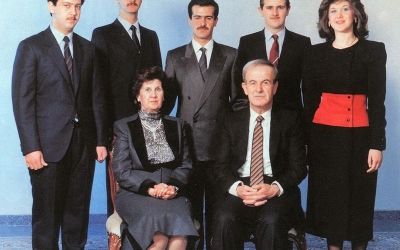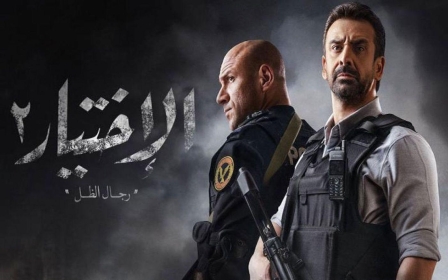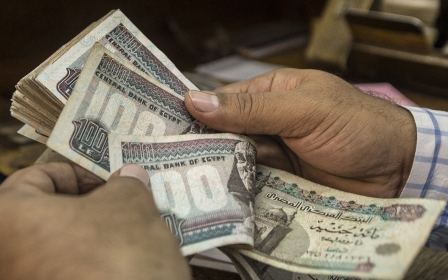Al-Ikhtiyar 3: Why an Egyptian Ramadan drama is provoking anger
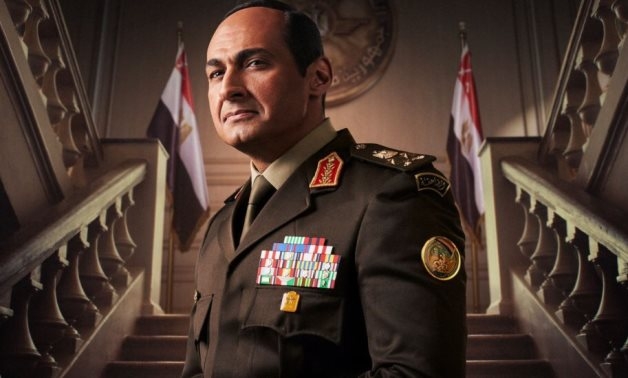
In the Arab world, Ramadan is a time of year when blockbuster TV shows featuring the region's biggest stars make their debuts.
With enough episodes to last the entire month, families usually sit down to watch the programmes after the breaking of the fast at sunset.
While normally, the subject matter revolves around the usual entertainment cliches of love, family disputes and historical drama, this year one show in particular is drawing criticism for its portrayal of one of the bloodiest episodes in the region's recent history.
Al-Ikhtiyar 3 (The Choice 3) has been slammed for "falsifying facts and fooling people" with its depiction of the July 2013 military coup that overthrew Egypt's first democratically elected president, Mohamed Morsi.
The series chronicles the hours leading up to the military takeover, which was engineered by the country's then-defence minister and current president, Abdel Fattah el-Sisi.
The coup in 2013 ended Egypt's brief experiment with democracy following the 25 January revolution of 2011.
Morsi was elected president in 2012, but his time in the role was marred by protests and suspicion that the Muslim Brotherhood, to which he belonged, was trying to muscle out other political parties.
The military made its move after protesters gathered in Cairo's Tahrir Square in late June 2013, overthrowing Morsi and violently suppressing his supporters in a series of massacres.
Despite Sisi's promise to restore democracy, the former defence minister put himself forward for the presidency and won a poll widely seen as a rubber-stamp election.
Purportedly based on "real life" events, Al-Ikhtiyar portrays a stoic, thoughtful and surprisingly tall Sisi doing what was needed to protect the country's slide into civil war.
One trailer advertising the show promises to take viewers "behind the scenes of Egypt's most dangerous 96 hours," further claiming that the series will demonstrate Sisi's "determination to save Egypt from the Muslim Brotherhood's dark path."
The show's depictions have sparked outrage among human rights activists and members of Egypt's opposition, who have dubbed it an example of historical revisionism.
'Rewriting' history
In a docudrama approach, the show weaves together a fictionalised retelling of the final days of Morsi's presidency, alongside archive footage and leaked material apparently featuring senior Muslim Brotherhood leaders.
Some of the figures depicted alongside Morsi include the late former defence minister Hussein Tantawi and Muslim Brotherhood leaders like Mohamed Badie, the movement's supreme guide, and Khairat al-Shater, its deputy supreme guide.
Members of the Brotherhood, which was banned in Egypt in the aftermath of the coup, are depicted as scheming to establish total control of the state and undermine the Egyptian people's hopes for democracy.
In contrast, Sisi is presented as a man bound by duty to act to prevent the conspiracy from succeeding.
The show paints a picture of the general's life away from the offices of power. Here he is spending time with his family at home. There he is catching up with his mother.
Chilling and sinister music plays for members of the Brotherhood, while heroic and empowering composition accompanies Sisi and his officers.
Titled "Brotherhood of the State", the third episode of the show depicts a Christian couple panicking over the Brotherhood's impending implementation of Sharia law.
The same episode begins with an apparent meeting between Mohamed Badie, and then-defence minister Sisi, in which Badie acknowledges Sisi's popularity among the masses and soldiers.
During an intense conversation, Sisi delivers a calm but firm warning to the Brotherhood leader, telling Badie his organisation is "intruding in issues that do not interest them."
Some social media users pointed out that such depictions do not correspond with the deferential demeanour Sisi publicly took while serving as defence minister during the Morsi presidency.
"They are only trying to erase from our memory the images of the real Sisi, standing before him with his head bowed and submissive, sitting like a shy girl in front of her fiance," one social media user said, sharing images of Sisi with Morsi during the latter's presidency.
Criticism and mockery
Exiled Egyptian actor Amr Waked has added his voice to the chorus of criticism, calling the series a "comedy" that presents a reality quite different from the one Egyptians "lived and observed."
The renowned actor, who is outspoked on human rights abuses in Egpt said: "We all know who the liar and deceiver is, (Sisi) said he would not run for elections and would save people from poverty but instead ended up being a politician that sold the country."
On social media, ordinary Egyptians and others from across the Arab world also poked fun at what they saw as an attempt by Sisi to rehabilitate his image.
"He will die trying to change peoples' views of him, we still see him and know he is dumb," one person wrote.
There’s a TV series in Egypt going on at the moment in Ramadan called “Al Ikhtyar 3” (The Choice 3)
— Abu Nur (@_AbuNur_) April 6, 2022
It shows the 2013 coup and Rabaa massacre from a pro-govt/military perspective and presents Sisi as a pious strongman doing his duty.
State-run media and movies 🤮 pic.twitter.com/SHQQIJaRB1
Others, such as Egyptian critic and filmmaker Hossam al-Ghomri, wondered whether the show had been created precisely in order to boost Sisi's popularity.
Some of the ire was reserved for the programme's producers. One Qatari social media user wrote: "At a time when we need to be united, the producers of Ikhtiyar 3 resort to fomenting more divisions and disagreements within Egyptian society, giving preference to one (political) trend."
Rabaa massacre
This is not the first time the Ikhtiyar series has faced criticism for its alleged whitewashing of Egyptian government abuses.
The show's second season, which was broadcast in 2021, sparked outrage for its depiction of the Rabaa massacre, the worst mass killing of civilian protesters in modern Egyptian history, with around 1,000 deaths.
Those protesting were demanding a restoration of Morsi's presidency and a return to civilian rule.
In one scene in the second season, Egyptian officers discuss the killings justifying them by arguing that those killed had been armed.
According to Egyptian media reports, Egyptian Media Group, which owns the show's production company, Synergy, is itself owned by Eagle Capital, an investment firm linked to Egypt's intelligence service.
Synergy has been heavily criticised for the content it produces, which critics have labelled "propaganda".
The alleged involvement of Egypt's intelligence service in the media is seen by critics as part of a government effort to legitimise Sisi's rule and influence public perceptions.
While keeping a strong grip on power by cracking down on all forms of dissent, Sisi has had to deal with a faltering economy and discontent over the stifling of freedoms fought for during the 2011 revolution.
Middle East Eye propose une couverture et une analyse indépendantes et incomparables du Moyen-Orient, de l’Afrique du Nord et d’autres régions du monde. Pour en savoir plus sur la reprise de ce contenu et les frais qui s’appliquent, veuillez remplir ce formulaire [en anglais]. Pour en savoir plus sur MEE, cliquez ici [en anglais].


